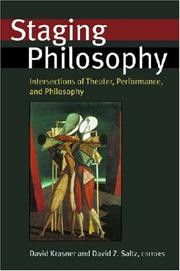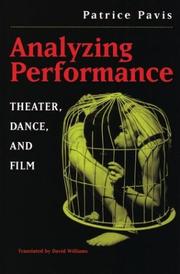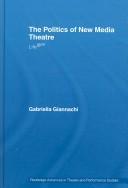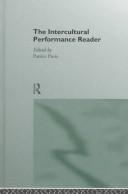| Listing 1 - 10 of 13 | << page >> |
Sort by
|
Book
ISBN: 9781138805514 9781315752365 9781317617914 9781317617921 9780815376507 1315752360 1138805513 Year: 2015 Volume: 40 Publisher: New York: Routledge,
Abstract | Keywords | Export | Availability | Bookmark
 Loading...
Loading...Choose an application
- Reference Manager
- EndNote
- RefWorks (Direct export to RefWorks)
This book offers a timely discussion about the interventions and tensions between two contested and contentious fields, performance and phenomenology, with international case studies that map an emerging 21st century terrain of critical and performance practice. Building on the foundational texts of both fields that established the performativity of perception and cognition, Performance and Phenomenology continues a tradition that considers experience to be the foundation of being and meaning. Acknowledging the history and critical polemics against phenomenological methodology and against performance as a field of study and category of artistic production, the volume provides both an introduction to core thinkers and an expansion on their ideas in a wide range of case studies. Whether addressing the use of dead animals in performance, actor training, the legal implications of thinking phenomenologically about how we walk, or the intertwining of digital and analog perception, each chapter explores a world comprised of embodied action and thought. The established and emerging scholars contributing to the volume develop insights central to the phenomenological tradition while expanding on the work of contemporary theorists and performers. In asking why performance and phenomenology belong in conversation together, the book suggests how they can transform each other in the process and what is at stake in this transformation.
Performing arts --- Theater --- Philosophy --- Performing arts - Philosophy --- Theater - Philosophy
Book
ISBN: 9780415624978 9780415624985 0415624975 0415624983 9780203103838 9781136246579 9781136246524 9781136246562 0203103831 Year: 2015 Publisher: New York, NY: Routledge,
Abstract | Keywords | Export | Availability | Bookmark
 Loading...
Loading...Choose an application
- Reference Manager
- EndNote
- RefWorks (Direct export to RefWorks)
Performing arts --- Performance art --- Theater --- Philosophy. --- Philosophy --- Performing arts - Philosophy --- Performance art - Philosophy --- Theater - Philosophy
Book
ISBN: 1283358921 9786613358929 9027279004 9789027279002 9781556190148 155619014X 155619014X 9789027224095 9027224099 Year: 1987 Volume: 5 Publisher: Amsterdam: John Benjamins,
Abstract | Keywords | Export | Availability | Bookmark
 Loading...
Loading...Choose an application
- Reference Manager
- EndNote
- RefWorks (Direct export to RefWorks)
n recent years, the post structuralist theories seem to have created a split in theatrological research. But, as André Helbo analyses in this book , a dialectic theory of the semiotic and the symbolic exchange bring to light a specific paradigm. From his wide experience as a semiotician and a theatrologist, the author has developed an analysis for the theory of spectacle. Focusing his study on a critical theory of the performing arts, and examining the fundamental controversies, he then offers new perspectives and new instruments of analysis: the social aspects, readability/visibility, coheren
Performing arts --- Semiotics --- Semiotics. --- Philosophy. --- Philosophy --- Performing arts - Semiotics --- Performing arts - Philosophy

ISBN: 128259754X 9786612597541 0472025147 9780472025145 0472069500 0472099507 9780472069507 9780472099504 Year: 2006 Publisher: Ann Arbor
Abstract | Keywords | Export | Availability | Bookmark
 Loading...
Loading...Choose an application
- Reference Manager
- EndNote
- RefWorks (Direct export to RefWorks)
Performing arts -- Philosophy. --- Performing arts -- Social aspects. --- Performing arts --- Social aspects --- Philosophy --- Philosophy. --- Social aspects.
Book
ISBN: 9782842423193 2842423194 Year: 2012 Publisher: Belval: Circé,
Abstract | Keywords | Export | Availability | Bookmark
 Loading...
Loading...Choose an application
- Reference Manager
- EndNote
- RefWorks (Direct export to RefWorks)
Pourquoi les artistes du début du vingtième siècle allaient-ils plus souvent au cirque qu'au théâtre ? Quel nouveau pacte s'est-il noué là ? Le cirque, considéré comme un art mineur et populaire, répond au nouveau système du monde démocratique. Il est par essence le spectacle de la vie moderne, et se lit comme le négatif de l'oeuvre d'art totale aux sources de la pluridisciplinarité artistique. Car, le cirque moderne ne sert aucun autre objectif que celui de l'action même.Mais cela suffit-il pour dégager le spectateur de la fascination hypnotique de l'art total ? Une interrogation incontournable s'il revient en mémoire l'instrumentalisation de l'esthétique par le politique, autorisée par ce processus artistique. A travers une histoire kaléidoscopique des arts, qui voit l'enquête remonter aux sources de la modernité, Du Théâtre au Cirque du monde interroge la nouvelle situation qui a vu les artistes investir l'action selon des objectifs bien différents.Le spectacle du cirque avec les qualités que ses numéros convoquent en fournit, bien plus justement que le théâtre, la matrice à partir de quoi une échappée aux nihilismes des deux derniers siècles s'avère envisageable. Où l'on verra à l'observation de diverses stratégies artistiques que les conditions d'une démobilisation dans le temps même de l'action sont encore celles qui favorisent l'éclosion d'un acte libre, dans le respect de soi et le respect de l'autre.
Circus --- Modernism (Aesthetics) --- Cirque --- Modernisme (Esthétique) --- History --- Histoire --- Performing arts --- Philosophy --- Modernisme (Esthétique) --- Arts du spectacle --- Philosophie. --- Circus - Philosophy --- Performing arts - Philosophy

ISBN: 0472066897 0472096893 9780472066896 Year: 2003 Publisher: Ann Arbor: University of Michigan press,
Abstract | Keywords | Export | Availability | Bookmark
 Loading...
Loading...Choose an application
- Reference Manager
- EndNote
- RefWorks (Direct export to RefWorks)
theater --- filmkunde --- hedendaagse dans --- Theatrical science --- Film --- Acting --- Performing arts --- Semiotics --- Philosophy --- Performing arts. --- Semiotics. --- Philosophy. --- Performing arts - Semiotics --- Performing arts - Philosophy --- Arts du spectacle --- Critique et interprétation
Book
ISBN: 9781501349164 1501349163 Year: 2019 Publisher: New York: Bloomsbury academic,
Abstract | Keywords | Export | Availability | Bookmark
 Loading...
Loading...Choose an application
- Reference Manager
- EndNote
- RefWorks (Direct export to RefWorks)
"Stanley Cavell, just recently deceased, was, by many accounts America's greatest philosophical thinker of film. Like Bazin in France and Perkins in England, Cavell did not just transform the American capacity to take film seriously as a subject for philosophical criticism, he had first to invent that legitimacy. Part of his efforts involved the creation of several key-now canonical-texts in film studies, among them the seminal The World Viewed along with Pursuits of Happiness and Contesting Tears. The present collection offers a concerted group effort to analyze and reflect anew upon Cavell's still-scintillating contributions to the very thought of film-and its philosophical significance. Mounted by some of today's most compelling writers on cinema, these investigations take careful account of Cavell's legacy, once and ongoing. In these pages, seasoned scholars and emerging talent artfully and expertly explore what precisely Cavell bequeathed- what endures, what stands in need of revision or updating, and how his writing remains vital and essential to any contemporary approach to the philosophy of film"--
Cavell, Stanley, --- Criticism and interpretation. --- Performing arts --- Motion pictures --- Aesthetics --- Philosophy --- Criticism and interpretation --- Performing arts - Philosophy --- Motion pictures - Philosophy --- Cavell, Stanley, - 1926-2018 - Criticism and interpretation --- Cavell, Stanley, - 1926-2018

ISBN: 9780415349468 9780203695142 9781134272570 9781134272617 9781134272624 9780415544092 0415544092 041534946X 0203695143 Year: 2007 Publisher: New York: Routledge,
Abstract | Keywords | Export | Availability | Bookmark
 Loading...
Loading...Choose an application
- Reference Manager
- EndNote
- RefWorks (Direct export to RefWorks)
Premier livre dans le domaine à explorer les liens entre les théories de la mondialisation et de la surveillance, de la bipuissance et de la biopolitique, de la performance et du théâtre, de l’informatique et de la politique, « The Politics of New Media Theatre » est une enquête sur le rôle politique joué par le théâtre des nouveaux médias. Gabriella Giannachi explore comment les nouveaux arts médiatiques se constituent en tant que mouvement politique radical et présente une analyse du rôle de la virtualité dans la performance radicale et de la politique dans les pratiques de réalité virtuelle et mixte. Cette nouvelle œuvre exceptionnelle offre une analyse des principaux textes et œuvres d’art politiques, philosophiques et artistiques, et représente une étape importante pour quiconque s’intéresse aux nouvelles technologies, au théâtre et à la politique. "This book is a groundbreaking study of performance that responds to, adopts and subverts current philosophical, political and economic practices. Not only does Gabriella Giannachi show how new media theatre can affect society, she also demonstrates that knowledge produced by and through performance is paradigmatic towards an understanding of the contemporary."--Jacket.
Art --- Theatrical science --- anno 1900-1999 --- Theater --- Theater and the Internet. --- Performing arts --- Political aspects. --- Philosophy. --- Performing arts - Philosophy --- Art et politique --- Mondialisation --- Art numérique --- Théâtre --- Nouveau média --- Réalité virtuelle
Book
ISBN: 9782213627083 2213627088 Year: 2005 Publisher: Paris: Fayard,
Abstract | Keywords | Export | Availability | Bookmark
 Loading...
Loading...Choose an application
- Reference Manager
- EndNote
- RefWorks (Direct export to RefWorks)
Ce livre est un livre de colère. On nous casse le théâtre. On nous casse l'opéra. La mise en scène est devenue totalitaire et le metteur en scène un dictateur. Ses fantasmes ont le devoir de s'imposer à tous ceux qui regardent comme à ceux qui jouent, mais plus particulièrement à l'oeuvre. Le Paradoxe du comédien de Diderot est-il toujours vrai ? Faut-il y ajouter un Paradoxe du spectateur, un Paradoxe du musicien ? Puisque les musiciens restituent avec de plus en plus de fidélité les chef-d'oeuvre de l'opéra, exactement au moment où les metteurs en scène s'acharnent à les défigurer. Mais depuis peu, le public se révolte. On ovationne les musiciens, on siffle les malfaisants qui polluent la scène à coups de millions d'euros. Vont-ils comprendre ? Pas sûr. Alors il faut gueuler plus fort. Le public a toujours raison.
Performing arts --- France --- Philosophy --- Performing arts - Philosophy --- Theaters --- Theater --- Théâtre --- Stage-setting and scenery --- Production and direction --- Décors et mise en scène --- Production et mise en scène --- Performing arts. --- Philosophy.

ISBN: 041508153X 9780415081542 0415081548 9780415081535 Year: 1996 Publisher: London: Routledge,
Abstract | Keywords | Export | Availability | Bookmark
 Loading...
Loading...Choose an application
- Reference Manager
- EndNote
- RefWorks (Direct export to RefWorks)
Theatrical science --- Theater and society. --- Performing arts --- Intercultural communication. --- Théâtre et société --- Arts du spectacle --- Communication interculturelle --- Philosophy. --- Philosophie --- Theater and society --- Intercultural communication --- Philosophy --- Théâtre et société --- Actors --- Society and theater --- Theater --- Cross-cultural communication --- Communication --- Culture --- Cross-cultural orientation --- Cultural competence --- Multilingual communication --- Technical assistance --- Social status --- Social aspects --- Anthropological aspects --- Performing arts - Philosophy
| Listing 1 - 10 of 13 | << page >> |
Sort by
|

 Search
Search Feedback
Feedback About UniCat
About UniCat  Help
Help News
News